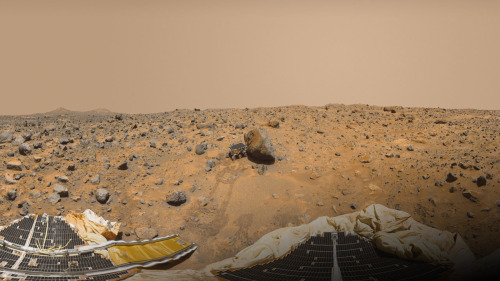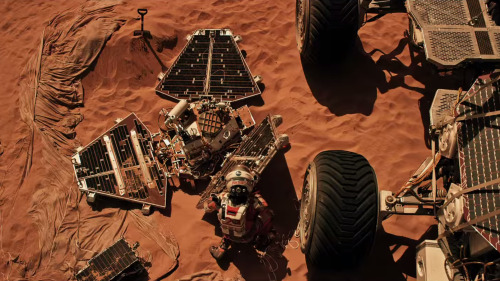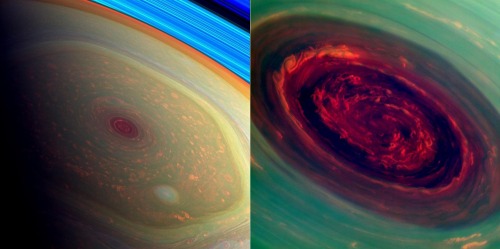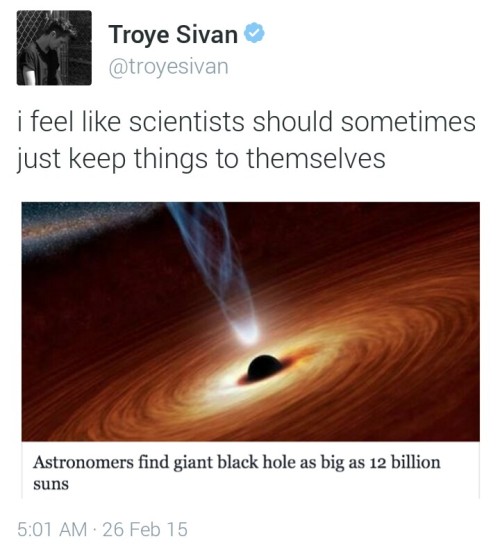Mars Pathfinder & Sojourner Rover (360 View) Explained


Mars Pathfinder & Sojourner Rover (360 View) Explained
Thanks to new technology, we can take a 360-degree tour of the 1997 Pathfinder mission landing site, including Sojourner, the first Mars rover. Check out this interactive YouTube panorama, and then…
…keep scrolling to find out more about each point of interest, how the Pathfinder mission compares to “The Martian” and NASA’s real Journey to Mars.

Yogi
“Yogi” is a meter-size rock about 5 meters northwest of the Mars Pathfinder lander and the second rock visited by the Sojourner Rover’s alpha proton X-ray spectrometer (APXS) instrument. This mosaic shows super resolution techniques applied to help to address questions about the texture of this rock and what it might tell us about how it came to be.

Twin Peaks
The Twin Peaks are modest-size hills to the southwest of the Mars Pathfinder landing site. They were discovered on the first panoramas taken by the IMP camera on the July 4, 1997, and subsequently identified in Viking Orbiter images taken over 20 years ago. They’re about 30-35 meters tall.

Barnacle Bill
“Barnacle Bill” is a small rock immediately west-northwest of the Mars Pathfinder lander and was the first rock visited by the Sojourner Rover’s alpha proton X-ray spectrometer (APXS) instrument. If you have some old-school red-cyan glasses, put them on and see this pic in eye-popping 3-D.

Rock Garden
The Rock Garden is a cluster of large, angular rocks tilted in a downstream direction from ancient floods on Mars. The rocky surface is comprised of materials washed down from the highlands and deposited in this ancient outflow channel.

MOAR INFO
Pathfinder Lander & Sojourner Rover
Mission Facts [PDF]
Science Results
Rock & Soil Types


This vista was stitched together from many images taken in 1997 by Pathfinder.

Pathfinder and Sojourner figure into Mark Watney’s quest for survival on the Red Planet in the book and movie, “The Martian.” See JPL’s role in making “The Martian” a reality: http://go.nasa.gov/1McRrXw and discover nine real NASA technologies depicted in “The Martian”: http://go.nasa.gov/1QiyUiC.

So what about the real-life “Journey to Mars”? NASA is developing the capabilities needed to send humans to Mars in the 2030s. Discover more at http://nasa.gov/journeytomars and don’t forget to visit me when you make it to the Red Planet. Until then, stay curious and I’ll see you online.
More Posts from Intergalacticnerd and Others



February 7, 1984 – Astronauts Bruce McCandless II and Robert L. Stewart make the first untethered spacewalk using the Manned Maneuvering Unit (MMU) during mission STS-41B of the Space Shuttle Challenger.
(NASA)
WHOA look at the moon
me literally every night no matter what phase the moon is in (via purple-space-freak)
Dust, stars, and cosmic rays swirling around Comet 67P/Churyumov–Gerasimenko, captured by the Rosetta probe. (Source)



Solar System: 2015 Year in Review

Two mysterious worlds explored for the first time. Liquid water seen flowing on Mars. A global ocean discovered hiding inside a moon of Saturn. Even during our Era of audacious solar system exploration, 2015 stands out. Here are a few highlights:
1. New Horizons Reveals the Face of Pluto

Whether or not you call it a planet, Pluto entranced the people of Earth when it sent a love note from three billion miles away via our New Horizons spacecraft.
2. Dawn Comes to Ceres

The dwarf planet Ceres, the largest object in the main asteroid belt, teased explorers with its bizarre bright spots before finally giving up some of its secrets to the Dawn spacecraft. HERE are the latest findings.
3. Cassini Marks Discoveries and Milestones at Enceladus

When the Cassini spacecraft performs its final close flyby of Saturn’s icy moon Enceladus on Dec. 19, it will be a true milestone. Scientists using data from Cassini’s instruments have uncovered astounding secrets about this small moon, including (confirmed this year) the fact that its underground ocean of liquid water is global, and is home to hydrothermal vents.
4. We Confirmed Evidence that Liquid Water Flows on Today’s Mars

Findings from our Mars Reconnaissance Orbiter (MRO) provided the strongest evidence yet that liquid water flows intermittently — on present-day Mars.
5. Rosetta Passes Perihelion

The European Space Agency’s Rosetta mission had a remarkable year, re-establishing contact with the Philae lander and following comet 67P/Churyumov-Gerasimenko as it swung near the sun.
6. Mars Explorers Confirm Lakes Once Dotted Mars

A study from the team behind our Mars Science Laboratory/Curiosity Rover confirmed that Mars was once, billions of years ago, capable of storing water in lakes over an extended period of time.
7. MAVEN Finds a Culprit in the Loss of Mars’ Atmosphere

The Mars Atmosphere and Volatile Evolution (MAVEN) mission identified the process that appears to have played a key role in the transition of the Martian climate from an early, warm and wet environment that might have supported surface life to the cold, arid planet that Mars is today.
8. Akatsuki Gets a Second Chance at Venus

Five years after a mishap sent the spacecraft off course, the Japan Aerospace Exploration Agency (JAXA) successfully inserted the Venus Climate Orbiter “Akatsuki” into orbit around Venus. While the mission is not funded by NASA, an agency partnership with JAXA provides an opportunity for eight of our scientists to work with the Akatsuki team and study data from the spacecraft over the next year or so.
9. A Trailblazing Mission Sends Its Final Message from Mercury

After a flight of nearly 11 years, the highly successful MESSENGER mission ended when, as planned, the spacecraft slammed into the surface of Mercury.
10. Mars Reconnaissance Orbiter Completes 40,000 Orbits

Mars Reconnaissance Orbiter, at Mars since 2006, has orbited the Red Planet more than 40,000 times. The mission, which studies the whole planet from space, has shown that Mars is diverse and dynamic by way of many thousands of spectacular images and other kinds of data.
Make sure to follow us on Tumblr for your regular dose of space: http://nasa.tumblr.com
I don’t care if you don’t like space puns
I like space puns
comet me bro

Saturn’s hexagonal storm system in it’s north pole
Elon Musk has released this video of today’s Falcon 9 landing attempt. The first stage of the JASON-3 mission’s Falcon 9 touched down on the surface of the Autonomous Spaceport Drone Ship around ten minutes after today’s 1:42pm EST launch.
However, according to Musk, landing strut #3 didn’t lock in to place properly, and vehicle toppled over. In this newly-released video, the Falcon 9 can be seen gently coming to land on the desk of the ship, falling on the improperly secured leg shortly thereafter.
Musk also said that preliminary data suggests ice build up from foggy launch conditions may have caused the strut to improperly secure upon deployment.

-
 sakurafarron liked this · 1 year ago
sakurafarron liked this · 1 year ago -
 sadatmirza liked this · 1 year ago
sadatmirza liked this · 1 year ago -
 conversetheatrekid liked this · 4 years ago
conversetheatrekid liked this · 4 years ago -
 keanuismygod liked this · 4 years ago
keanuismygod liked this · 4 years ago -
 mi9dre5lec2ion liked this · 5 years ago
mi9dre5lec2ion liked this · 5 years ago -
 reddog1984 reblogged this · 5 years ago
reddog1984 reblogged this · 5 years ago -
 ardricael liked this · 5 years ago
ardricael liked this · 5 years ago -
 homosexualangelinthesky reblogged this · 5 years ago
homosexualangelinthesky reblogged this · 5 years ago -
 drunkenhills liked this · 6 years ago
drunkenhills liked this · 6 years ago -
 theseviolentdelights-insta liked this · 6 years ago
theseviolentdelights-insta liked this · 6 years ago -
 writetothemoon liked this · 6 years ago
writetothemoon liked this · 6 years ago -
 hazelandglasz liked this · 6 years ago
hazelandglasz liked this · 6 years ago -
 why-so-red liked this · 6 years ago
why-so-red liked this · 6 years ago -
 jarmilatblr liked this · 6 years ago
jarmilatblr liked this · 6 years ago -
 xferxanix liked this · 6 years ago
xferxanix liked this · 6 years ago -
 silverwolf02001 liked this · 6 years ago
silverwolf02001 liked this · 6 years ago -
 teenageunderdog liked this · 6 years ago
teenageunderdog liked this · 6 years ago -
 resylesy liked this · 6 years ago
resylesy liked this · 6 years ago -
 cabbagecrunt reblogged this · 6 years ago
cabbagecrunt reblogged this · 6 years ago -
 reyisbae580 liked this · 7 years ago
reyisbae580 liked this · 7 years ago -
 thealmightykurama reblogged this · 7 years ago
thealmightykurama reblogged this · 7 years ago -
 a-n-i-m-e-us reblogged this · 7 years ago
a-n-i-m-e-us reblogged this · 7 years ago -
 alnoobi302-blog liked this · 7 years ago
alnoobi302-blog liked this · 7 years ago -
 samiradaystar-blog liked this · 7 years ago
samiradaystar-blog liked this · 7 years ago -
 astex72 liked this · 7 years ago
astex72 liked this · 7 years ago -
 robhol272-blog liked this · 7 years ago
robhol272-blog liked this · 7 years ago -
 nugzzy liked this · 7 years ago
nugzzy liked this · 7 years ago -
 vladdonskoy-blog liked this · 7 years ago
vladdonskoy-blog liked this · 7 years ago -
 passionikeaccendonoilcuore reblogged this · 7 years ago
passionikeaccendonoilcuore reblogged this · 7 years ago -
 anony-mouse1 liked this · 7 years ago
anony-mouse1 liked this · 7 years ago -
 switchback-pony liked this · 7 years ago
switchback-pony liked this · 7 years ago -
 featherishere-blog liked this · 7 years ago
featherishere-blog liked this · 7 years ago -
 7even11eleven-blog liked this · 7 years ago
7even11eleven-blog liked this · 7 years ago -
 imtherealbillybatson liked this · 7 years ago
imtherealbillybatson liked this · 7 years ago -
 scott-mcallmelater liked this · 7 years ago
scott-mcallmelater liked this · 7 years ago -
 fidy1977 liked this · 7 years ago
fidy1977 liked this · 7 years ago -
 swacwaeth liked this · 7 years ago
swacwaeth liked this · 7 years ago
"Astronomy compels the soul to look upwards and leads us from this world to another." - Plato
147 posts